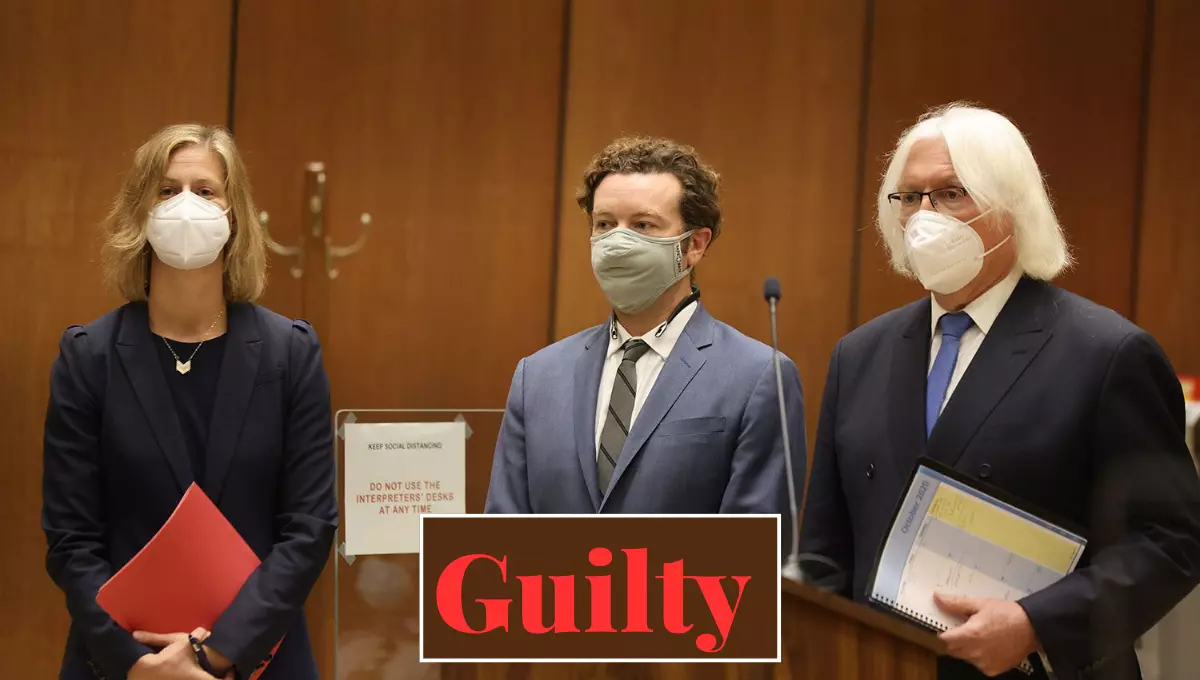Danny Masterson, the former actor of “That ’70s Show,” was convicted on two charges of forcible rape on Wednesday. Danny Masterson found guilty of rape.
The jury was unable to reach a decision on a third rape charge, voting 8-4 in favour of conviction.
On the two charges, Masterson faces a jail term ranging from 30 years to life. Masterson’s family, who were sat in the audience, let out an audible gasp shortly after the clerk read the guilty verdicts.
Between 2001 and 2003, Masterson was accused of raping three women at his Hollywood Hills residence. The jury found him guilty of raping two women in 2003, but it was unable to make a decision on an allegation from November 2001 involving a former partner.
Masterson was handcuffed and brought into custody after the verdict was read. Judge Charlaine Olmedo dismissed the defense’s plea that he be released pending sentencing. A hearing has been scheduled for August 4.
Bijou Phillips, Masterson’s wife, was observed sobbing in the front row of the audience.
One of the victims, identified in court as Jane Doe 2, delivered a statement in which she expressed relief that Masterson had been convicted. She also mentioned a pending civil lawsuit in which she and the other accusers are suing Masterson and the Church of Scientology for stalking and harassment.
“I am experiencing a complex array of emotions – relief, exhaustion, strength, and sadness – knowing that my abuser, Danny Masterson, will face accountability for his criminal behaviour,” she explained. “I am disappointed that he was not convicted on all counts, but I take great comfort in the fact that he, the Church of Scientology, and others will have to account fully for their heinous actions in civil court.”
The two guilty verdicts in the rape trial of celebrity Scientologist Danny Masterson are a relief.
— Leah Remini (@LeahRemini) May 31, 2023
The women who survived Danny Masterson's predation are heroes. For years, they and their families have faced vicious attacks and harassment from Scientology and Danny's…
Jane Doe 3, Masterson’s former lover, said in a statement that she was “devastated that he has escaped criminal prosecution for his heinous conduct against me.”
She stated her determination to seek justice in civil court, where she believes the three women will “shed light on how Scientology and other conspirators enabled and attempted to cover up Masterson’s monstrous behaviour.”
Los Angeles District Attorney George Gascón thanked the jurors and hailed the ladies for coming forward.
“Their strength and courage have been an inspiration to us all,” he remarked. “While we are disappointed that the jury did not convict on all counts, we respect their decision.”
Masterson’s first trial concluded in a hung jury in November, with the majority of the jury choosing to acquit on all three charges.
The case has shed light on Scientology’s beliefs, of which Masterson is a lifelong adherent.
All three alleged victims were members of the church at the time of the alleged assaults, but have since left. They further claim that the church discouraged them from reporting Masterson, a renowned church member due to his acting success.
Prosecutor Ariel Anson stated in closing arguments that Masterson used his position as a “upstart” in the church to rape the women without fear of repercussions.
“Like all predators, the defendant carefully sought out his prey,” Anson contended. “The church taught his victims that rape isn’t rape, that you caused it, and that you shouldn’t go to law enforcement.” What greater hunting ground could there be? The defendant is a star in Scientology, and he is untouchable.”
According to defence attorney Philip Cohen, the prosecution exploited Scientology to distract from contradictions in the victims’ statements.
“Why have we heard so much about Scientology?” Cohen was curious. “Could there be any other issues with the government’s case?”
Scientology was a prominent subject in the first trial as well. The allegation of drugging was the key difference between the two cases. The women testified in the first trial that after consuming a drink concocted by Masterson, they felt weak or queasy and had little recall. Prosecutors, however, did not directly claim that Masterson had put something in the drink to get the women drunk.
The prosecution changed its tune in the retrial, claiming that Masterson had really drugged the victims.
“They were all drugged,” Anson contended. “The defendant drugs his victims in order to gain control.” He does this in order to remove the victims’ ability to agree. It is not a question of consent. This is not a case of the criminal misinterpreting the victim’s signals. He has great physical power over them when he drugs them. You don’t want to have sexual relations? You have no choice… The defendant makes that decision for these victims, and he does it repeatedly.”
Cohen argued that there is no evidence substantiating the drugging allegation, such as a toxicology report. He further pointed out that there was no mention of narcotics in the actual charges.
“This is not a drug case,” Cohen clarified. “There is no tangible evidence of it.”
In 2004, one of the women reported Masterson to the LAPD, but prosecutors chose not to charge him. After the three ladies located each other and went to law enforcement jointly, the case was reopened in 2016.
Prosecutors were allowed to pursue the complaint because of a sex crimes “one-strike” provision that extends the statute of limitations for multiple forced rapes.
Cohen claimed that the ladies “tweaked” their accounts to fit a rape narrative after meeting and discussing the case.
“A woman has the absolute right to say no,” Cohen contended. “But when the ‘no’ comes 16 or 17 years later… that’s a terrifying scenario.”
